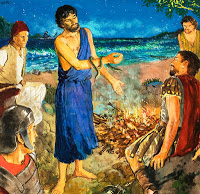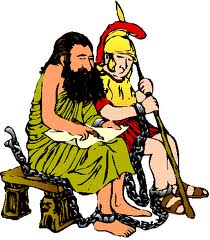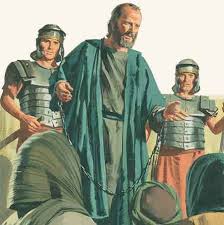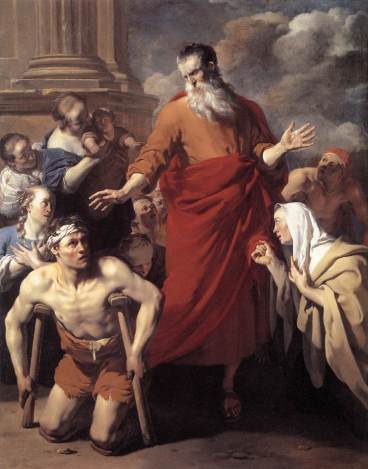1 When they had been brought safely through, then we found out that the island was called Malta.

1. What is Malta and why didn’t they know where they were?
These experienced sailors would certainly have known the island of Malta, but not this side of the island. Almost all the traffic to Malta came to the main port, on the other side of the island. They didn’t recognize this side of the island. GC
Malta, also called Melita (meaning refuge, which it proved to be for Paul and his companions), lies about 60 miles south of the island of Sicily. It is about 18 miles long and 8 miles wide. It is also about 500 miles west of Crete. People of Phoenician origin inhabited it in Paul’s day. Luke called them “barbarians” (Gr. barbaroi) meaning people whose culture was not Greek. These people were not savages or uncultured, however, as is clear from their hospitable treatment of the shipwreck victims. CN
2 The natives showed us extraordinary kindness; for because of the rain that had set in and because of the cold, they kindled a fire and received us all. 3 But when Paul had gathered a bundle of sticks and laid them on the fire, a viper came out because of the heat and fastened itself on his hand. 4 When the natives saw the creature hanging from his hand, they began saying to one another, “Undoubtedly this man is a murderer, and though he has been saved from the sea, justice has not allowed him to live.” 5 However he shook the creature off into the fire and suffered no harm. 6 But they were expecting that he was about to swell up or suddenly fall down dead. But after they had waited a long time and had seen nothing unusual happen to him, they changed their minds and began to say that he was a god.
2. Is there some theological lesson here, ie. Christians immune from snake bites?

You remember that at the end of the Gospel of Mark there is this promise: “And these signs shall follow them that believe; In my name shall they cast out devils; they shall speak with new tongues; They shall take up serpents; and if they drink any deadly thing, it shall not hurt them; they shall lay hands on the sick, and they shall recover” (Mark 16:17–18). I believe that these signs were confined to that time before the New Testament was completed when the believers needed the sign gifts to substantiate the message of the gospel.
May I point out something else. Paul did not deliberately pick up this viper. Paul was not tempting God.
The Greek word here for “vengeance” is dike which actually would be better translated “justice.” “Yet justice suffereth not to live.” In other words, they felt that Paul was guilty of a great crime, and justice was catching up with him. He had escaped from the sea but now he would surely die of the venom. Very frankly, I think they sat down to watch what would happen to him. They expected that any moment he would begin to show swelling in his hand and arm, then would fall down dead. They knew by sad experience, as that is what had happened to their own people. They expected it to happen to Paul.
Notice that these pagans did have a sense of justice. They assumed that Paul was a murderer and that he deserved punishment. This incident shows that throughout the Roman Empire there was a sense of justice. Pagan Rome made that contribution to the world. Rome was noted for justice, not mercy. Sins were not forgiven. If you broke the law, you paid the penalty. Under the iron heel of Rome the world was crying for mercy. This was a preparation for the coming of Christ who came as the Savior from sin—that mankind might know the mercy and forgiveness of God. JVM
7 Now in the neighborhood of that place were lands belonging to the leading man of the island, named Publius, who welcomed us and entertained us courteously three days. 8 And it happened that the father of Publius was lying in bed afflicted with recurrent fever and dysentery; and Paul went in to see him and after he had prayed, he laid his hands on him and healed him. 9 After this had happened, the rest of the people on the island who had diseases were coming to him and getting cured. 10 They also honored us with many marks of respect; and when we were setting sail, they supplied us with all we needed.
3. How are Paul’s activities here serve as a blessing to all.
Publius is called chief man (Gk. prōtos) of the island. The term has been found on Maltese inscriptions and was probably a formal title. The description of Publius’s father as having fever and dysentery fits the symptoms of an infection caused by goat’s milk called “Malta fever.” The coming of the whole region with their sick is reminiscent of what happened after Jesus healed Peter’s mother-in-law. ESVN
What is the connection between the serpent, the sick, and the supplies? I would suggest that here, as earlier (on board the ship), Paul’s presence proved to be a blessing to all. All on board the ship were saved, on account of Paul. Because of Paul’s ministry of
healing the sick on Malta, everyone enjoyed the generous provisions supplied by the grateful people of the island. Paul’s presence was the basis for the blessings all the others enjoyed. RD
11 At the end of three months we set sail on an Alexandrian ship which had wintered at the island, and which had the Twin Brothers for its figurehead. 12 After we put in at Syracuse, we stayed there for three days. 13 From there we sailed around and arrived at Rhegium, and a day later a south wind sprang up, and on the second day we came to Puteoli. 14 There we found some brethren, and were invited to stay with them for seven days; and thus we came to Rome.
4. Who were these brethren found at Puteoli?
Puteoli (modern Pozzuoli) was a major port for Roman traffic, some 257 miles (413 km) by road up the western coast of Italy from Rhegium. The brothers at Puteoli are evidence that Christianity had not only reached Rome by this time (c. a.d. 60) but was widely dispersed in Italy. It is not strange that a church existed there. Puteoli had a Jewish colony. Perhaps Roman Christians had planted this church, or perhaps Jewish converts had done so. The local Christians were very generous with their hospitality to Paul and his companions. “And thus we came to Rome” expresses Luke’s eagerness to reach Paul’s goal city. They had not really arrived in Rome

However, Luke viewed Puteoli as close enough to warrant this enthusiastic announcement of their arrival, even though Paul still had 130 miles to travel.
15 And the brethren, when they heard about us, came from there as far as the Market of Appius and Three Inns to meet us; and when Paul saw them, he thanked God and took courage. 16 When we entered Rome, Paul was allowed to stay by himself, with the soldier who was guarding him.
5. Wasn’t Paul dangerous threat to the Roman empire?
While in Roman custody, Paul appears to have been staying on his own andat his own expense, guarded only by a common soldier. This may reflect the fact that Paul’s case was already at this stage—perhaps because of the description of the case provided by Festus—considered of little importance, and Paul of little danger. We know nothing more of Paul’s contact with the Roman government or the disposition of his case from the book of Acts. ASB
Possibly through Julius’ intervention, Paul was allowed to live under guard

in his own rented quarters MSBN
The “Captain of the Guard” here alluded to was probably the “præfectus prætorio,” one of whose duties was to take charge of those persons from the provinces whose causes were to be brought before the Emperor.
Paul was suffered to dwell by himself. This lenity was probably due to the commendation of the centurion Julius, who cannot but have found that he had charge of no ordinary prisoner in St Paul, and having been saved and aided by the Apostle’s advice would naturally wish to do something in return.
with a soldier that kept [R. V. guarded] him] The custom was that the prisoner should be chained by one hand to the soldier while he was on guard. And to this chain the Apostle often makes allusion in the Epistles (Ephesians, Philippians, Colossians and Philemon) written during this imprisonment. See also below, Act_28:20. The frequent change of the person who guarded him would give the Apostle an opportunity of spreading the knowledge of his cause, and the message of the Gospel, very widely among the Prætorian guards who had him in charge, and many things would have been heard by them from the soldiers who had sailed with St Paul, which would make them ready to attend to the narrative of their prisoner.
17 After three days Paul called together those who were the leading men of the Jews, and when they came together, he began saying to them, “Brethren, though I had done nothing against our people or the customs of our fathers, yet I was delivered as a prisoner from Jerusalem into the hands of the Romans. 18 “And when they had examined me, they were willing to release me because there was no ground for putting me to death. 19 “But when the Jews objected, I was forced to appeal to Caesar, not that I had any accusation against my nation. 20 “For this reason, therefore, I requested to see you and to speak with you, for I am wearing this chain for the sake of the hope of Israel.”
6. What was the purpose of this meeting?
Paul began immediately to prepare to witness. He wanted to see the leaders

of the Jewish community soon for two reasons. He wanted to preach the gospel to them as Jews first. He also wanted to take the initiative in reaching out to them with an explanation of why he was in Rome. He wanted to do so before they arrived at false conclusions concerning his reasons for being there. Estimates of the Jewish population in Rome in the first century vary between 10,000 and 60,000. Undoubtedly before sending for these Jews Paul satisfied himself that they were not antagonistic to him already. He would hardly have invited to his house men who just might have been as hostile as the Jerusalem assassins. Paul may have been unable to go to the synagogues because of his prisoner status. On the other hand he may have chosen to explain his situation to a small group of Jewish leaders on his own turf. He could have done this to preclude another riot that would have complicated his formal acquittal. So, only three days after his arrival in Rome, Paul sent for these men.
“Paul’s statement in 28:17-20 is a summary of the preceding trial narrative and imprisonment speeches in Acts 22—26. It presents what the narrator most wants readers to retain from that long narrative.”
Paul emphasized these points in his explanation. He had done nothing against the Jews or their customs (v.17). The Roman authorities in Judea had already declared him innocent (v. 18). He had appealed to Caesar because the Jews in Judea challenged the Romans’ verdict, not because Paul had any grievance against the Jews (v. 19). His present condition grew out of the promises God had given Israel. CN
21 They said to him, “We have neither received letters from Judea concerning you, nor have any of the brethren come here and reported or spoken anything bad about you. 22 “But we desire to hear from you what your views are; for concerning this sect, it is known to us that it is spoken against everywhere.”
7. How is that the Jews in Rome had not heard of Paul’s situation?
The historical character of the reply of the Jews, viz., that they had received neither any written nor verbal communications which were unfavorable to Paul personally, has been frequently and harshly impugned. It has been asserted that such a reply could not possibly have been made by them, and that, hence, the whole statement is incredible. Those who adopt this view,

think it just and proper to assume that the Roman Jews must necessarily have received information respecting Paul from the Sanhedrin at Jerusalem. Others have, however, in opposition to this view, insisted with great justice on the following considerations:—Before the appeal of Paul was made, the leaders of the Sanhedrin could have had no reason for writing to the Jewish community at Rome in reference to him, for they had not even remotely expected such an issue (Meyer). But after the appeal was made, they no longer had time to convey intelligence to the Roman Jews previously to the personal arrival of Paul (Bengel, Meyer), as he probably commenced his journey soon after the appeal was made [ch. Act_25:12; Act_27:1. “Had any (messengers of the Sanhedrin) left within a few days, the same storm would have in all probability detained them over the winter, and they could not certainly have made a much quicker voyage than Paul’s ship to Puteoli.”—There is, however, another circumstance, which may seem surprising, namely, that these Roman Jews do not appear to have received even privately and incidentally, any information respecting Paul from Jews of Palestine, who were passing through Rome.
Now it must be admitted, that they do not distinctly say that they had not hitherto heard any thing whatever concerning Paul: indeed, they themselves acknowledged, Act_28:22, that Christianity every where met with contradiction. Hence they had heard of Christianity, and of the disputes which, in consequence of it, had arisen in various places; and they had assuredly also heard of the individuals who proclaimed the Gospel, especially of Paul himself. All that they deny is, simply, that they had heard “any thing evil” [τι – – πονηρόν], that is, any thing that was morally bad, concerning him. They may have expressed themselves in this manner, partly, from prudential considerations; in view of the imperial court and authority, from which the Roman Jews had already greatly suffered, and, partly, from a desire to encourage Paul to speak to them without reserve. If they observe silence with respect to the Christian congregation itself which existed in the capital, this circumstance, when we consider the peculiar state of affairs in a great city like Rome, can the less surprise us, as it is apparent that they are intentionally reserved in their remarks. [Meyer here adds: “However cautious and officially reserved they are, the Jewish contempt of Christianity may be plainly seen.”—Tr.]. If there actually were a contradiction between the fact of the existence of a Christian congregation at Rome, on the one hand, and this act of ignoring it, on the other, the narrator must have been extremely short-sighted, if in this place, Act_28:22, he forgot that he had, a few verses above [Act_28:15], spoken of the Christian congregation of the city. LC
23 When they had set a day for Paul, they came to him at his lodging in large numbers; and he was explaining to them by solemnly testifying about the kingdom of God and trying to persuade them concerning Jesus, from both the Law of Moses and from the Prophets, from morning until evening. 24 Some were being persuaded by the things spoken, but others would not believe. 25 And when they did not agree with one another, they began leaving after Paul had spoken one parting word, “The Holy Spirit rightly spoke through Isaiah the prophet to your fathers, 26 saying, ‘GO TO THIS PEOPLE AND SAY, “YOU WILL KEEP ON HEARING, BUT WILL NOT UNDERSTAND; AND YOU WILL KEEP ON SEEING, BUT WILL NOT PERCEIVE; 27 FOR THE HEART OF THIS PEOPLE HAS BECOME DULL, AND WITH THEIR EARS THEY SCARCELY HEAR, AND THEY HAVE CLOSED THEIR EYES; OTHERWISE THEY MIGHT SEE WITH THEIR EYES, AND HEAR WITH THEIR EARS, AND UNDERSTAND WITH THEIR HEART AND RETURN, AND I WOULD HEAL THEM.”‘ 28 “Therefore let it be known to you that this salvation of God has been sent to the Gentiles; they will also listen.” 29 [When he had spoken these words, the Jews departed, having a great dispute among themselves.] 30 And he stayed two full years in his own rented quarters and was welcoming all who came to him, 31 preaching the kingdom of God and teaching concerning the Lord Jesus Christ with all openness, unhindered.
8. How did this quotation from Isaiah serve as an indictment of these Jews?
The blindness of the Jews could only be removed through faith in Jesus. Jesus has now been powerfully proclaimed to the Jewish leaders, and by and large they did not believe. The blindness remains, and it will only be removed through faith in Jesus as the promised Messiah. It is interesting, is it not, that Paul’s Epistle to the Romans focused on the relationship of the gospel to both Jews and Gentiles. Jewish unbelief is explained in a two-fold way: (a) they were not chosen (Romans 9:6-29); and (b) they did not believe

in Jesus, but sought to merit God’s favor by law-keeping (Romans 9:30—10:4). Because the Jews would not bring Gentiles to faith by being a “light to the Gentiles,” they were blinded, and the light of the gospel was taken to the Jews. I believe that Paul’s citation from Isaiah 6 in Acts 28 formally announced the commencement of the “times of the Gentiles.” Paul makes it clear that a day is yet to come when “the full number of the Gentiles has come in,” and then God will turn again to His people, opening their blind eyes so that “all Israel will be saved:”
· ESVN………….ESV Study Bible Notes
· MSBN…….MacArthur NASB Study Notes
· NIVSN…..NIV Study Notes.
· JVM ……………..J Vernon McGee,
· ACC ……………. Adam Clarke’s Commentary
· BN ……………..Barnes Notes
· WBC……………. Wycliffe Bible Commentary
· CN …… …………..Constables Notes
· IC………………….Ironside Commentary
· NET……………….Net Bible Study Notes.
JFB…………..Jamieson Fausset Brown Commentary
· VWS……………..Vincent Word Studies
· CMM………….Commentary on Matthew and Mark
· BDB………….. Barclay’s Daily Study Bible (NT)
· Darby………..John Darby’s Synopsis of the OT and NT
· Johnson………Johnson’s Notes on the New Testament.
· NTCMM…………..The New Testament Commentary: Matthew and Mark.
· EHS………………….Expositions of the Holy Scriptures
· CPP…………………The Complete Pulpit Commentary
· SBC…………………Sermon Bible Commentary
· K&D……………….Keil and Deilitzsch Commentary on the OT
· EBC…………………Expositors Bible Commentary
· CBSC……………….Cambridge Bible for Schools and College
· GC……………………Guzik Commentary
· RD……………………. Robert Deffinbaugh
ASB………………….Apologetics Study Bible
LC………………..Lange’s Commentary
